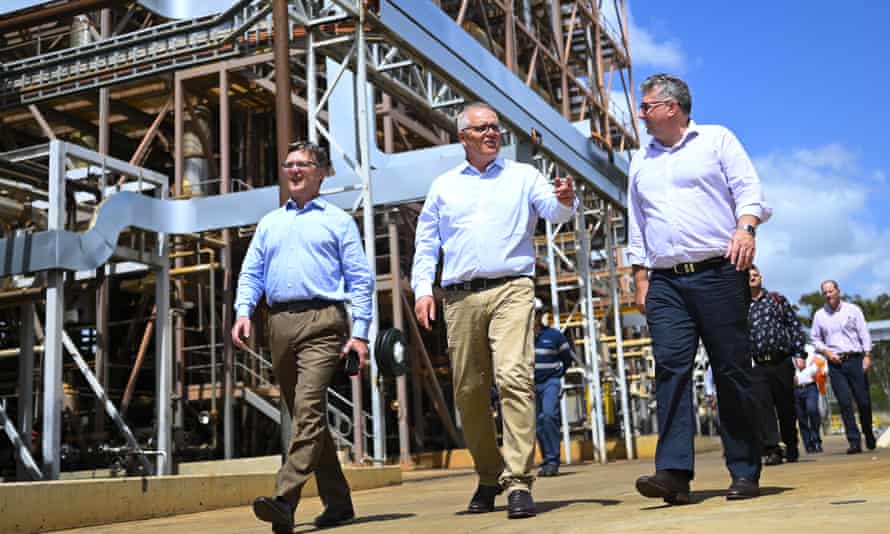Last modified on Tue 18 May 2021 14.40 AEST
When I was a kid, every year in early December we would go to the Geelong oil refinery in Corio. The refinery’s fire engine would cruise around, flash its lights and hand out gifts to us children of the employees. Now it seems like Christmas has come early for oil refinery owners who got a massive fossil fuel subsidy wrapped up with a “national security” bow.
The federal government has announced a fuel security package to shore up Australia’s two remaining oil refineries, in Geelong and in Brisbane, with a hefty price tag of up to $2bn.
Australia’s response to fuel security has been a hodgepodge of ineffective policies and taxpayer-funded subsidies, and this week’s announcement is another Band-Aid solution. It sits neatly in the budget alongside the $8bn in fuel tax credits (which is set to rise to just under $10bn in five years).
It is worth asking what Australians are getting for the $2bn, which is equivalent to $80 from every single one of us to these two refineries. If this is a matter of national security, why hasn’t the federal government taken a national stake in both facilities, rather than leaving it to the shareholders of Viva in Geelong and Ampol in Brisbane to decide on what to do?
The idea of being insecure from foreign oil is … well, a foreign one. Australia is an energy super power in all other respects, apart from oil. In 2019, Australia was the largest exporter of coal in the world, and the largest exporter of liquefied natural gas (LNG) and together is the third-largest exporter of fossil fuels after Russia and Saudi Arabia. But Australia’s oil production has already peaked and is likely to continue to decline.
According to the federal government’s Interim Liquid Fuel Security Review in April 2019, “Australia is heavily reliant on imports of liquid fuel, and this is unlikely to change”. Australia imports around 90% of its fuel security needs. That includes 60% of our refined product and 80% of the crude oil that goes into our domestic refineries. And even if all of Australia’s local oil was refined for local use, this would meet only about 25% of our needs, according to the government’s own interim report.
And that was when Australia had four oil refineries. Now it is down to two. And we still haven’t seen the final version of this Liquid Fuel Security Report. I doubt we will ever see it.
Because the only long-term solution is to get off oil and electrify our transport.
Unfortunately, the same federal budget that gifted our oil refineries billions offered nothing in the way of reducing demand through electric vehicle incentives. Not one cent. Three-quarters of Australia’s total liquid fuel demand is consumed by the transport sector. Transitioning transportation to run on domestically generated (and increasingly renewable) energy rather than foreign oil would clearly be a win for national fuel security.
But Australia remains a laggard in EV policy and uptake. The government’s recently released Future Fuels Discussion Paper offers little to encourage EV uptake, instead ruling out policies that work like purchase incentives for EVs, fleet procurement targets and vehicle CO2 standards.
According to the energy minister, Angus Taylor, short-term subsidies for EV purchases do not represent value for money for taxpayers, but multibillion dollar subsidies for oil refineries do. Oil refineries get a whole carrot farm while EV policy gets the stick.
The government’s approach to transport is much like its approach to electricity generation: fixated on more (fossil-fuelled) supply and ignoring efforts to address demand. It took years to secure an electricity market rule change that allowed users to be rewarded for reducing their electricity use during times of peak demand rather creating more supply.
The absence of any interest or leadership from the federal government on EVs has left a vacuum. The Victorian treasurer is filling this vacuum with a tax on electric vehicles, which might only entrench the demand for fossil fuelled transport. Following strong pushback, Victoria has brought in modest incentives to drive EV uptake and a 50% EV sales target by 2030.
Australia’s piecemeal approach to fuel security is unsustainable. It was this time last year that Taylor spent $94m to stockpile oil reserves stored securely in … Texas. A year later, as Americans desperately panic-buy fuel in the wake of the Colonial pipeline cyberattack, Australia’s offshore stockpile seems silly, not secure.
The only viable long-term solution to our liquid fuel insecurity is to get off fossil fuels. Instead we are giving them taxpayer handouts. The fact is, electrifying our transport system would be a gift to the nation that keeps on giving.

No comments:
Post a Comment